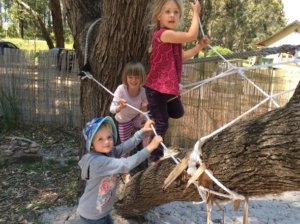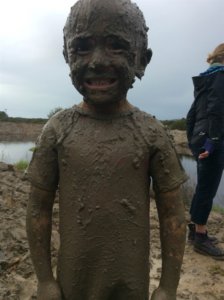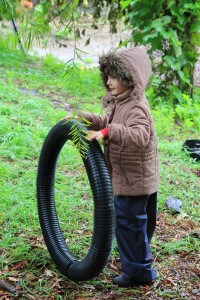
Nurturing positive behaviour and inspiring respect
Everything we do at Spirit of Play is about nurturing kids and adults. We do this by connecting with ourselves, with each other, with our community and with our environment. We believe that creative, caring, resilient kids will enjoy their present and be prepared for any kind of future.
Our play-based curriculum provides a holistic education that respects each child’s individual learning style and is strongly rooted in Denmark’s community and natural environment. Children are encouraged to explore their own physical, intellectual and emotional capabilities. They are challenged to set their own goals with their teachers. Spirit of Play Community School promotes a positive and supportive school community and provides an imaginative and aesthetic learning environment.

We support creative, connected and capable kids through our commitment to:
- High staff to student ratio
- Small class sizes
- Multi-Aged grouping
- Exceptional Staff
- Indoor and Outdoor Learning

At Spirit of Play we focus on supporting children to develop the ability to be self-directed in their learning. This fosters inspiration and independence.
Through a curriculum, which is organised and flexible, children and adults together negotiate the learning experience. The word respect surfaces often as does consultation. We respect the child as a natural, active learner, who should be consulted throughout the on-going process of learning.

See the articles below regarding the Spirit of Play approach to guiding behaviour, inspiring self-discipline, and respect.


Our Approach to Discipline in a Nutshell
Various philosophies and programs influence our approach to discipline. These include Relational Learning, Non-Violent Communication, No-Drama Discipline and Mindful Awareness Parenting.
We offer courses and reading material to staff members, families and community members to help adults to help children.
Discipline comes down to one simple phrase: Connect and redirect. Our first response should always be to offer soothing connection, then we can redirect behaviours. Even when we say no to children’s behaviour, we always want to say yes to their emotions, and to the way they experience things. As part of connecting and redirecting, we often give a choice: “Would you like to do this, or this?” – thus giving the child a part in the decision-making.
Here are the eight basic principles that guide us, from ‘No Drama Discipline’, by Siegel and Payne Bryson.
- Discipline is essential. We believe that teaching our kids and giving them what they need includes setting clear and consistent boundaries and holding high expectations for them – all of which helps them achieve success in relationships and other areas of their lives.
- Effective discipline depends on a loving, respectful relationship between adult and child. Discipline should never include threats or humiliation, cause physical pain, scare children, or make them feel that the adult is the enemy. Discipline should feel safe and loving to everyone involved.
- The goal of discipline is to teach. We use discipline moments to build skills so kids can handle themselves better now, and make better decision in the future. There are usually better ways to teach than giving immediate consequences. Instead of punishment, we encourage cooperation from our kids by helping them think about their actions, and by being creative and playful. We set limits by having a conversation to help develop awareness and skills that lead to better behaviour both today and tomorrow.
- The first step in discipline is to pay attention to kids’ emotions. When children misbehave, it’s usually the result of not handling big feelings well and not yet having the skills to make good choices. So being attentive to the emotional experience behind a behaviour is just as important as the behaviour itself. In fact, science shows that addressing kids’ emotional needs is actually the most effective approach to changing behaviour over time, as well as developing their brains in ways that allow them to handle themselves better as they grow up.
- When children are upset or having a ‘meltdown’, that’s when they need us most. We need to show them we are there for them, and that we’ll be there for them at their absolute worst. This is how we build trust and a feeling of overall safety.
- Sometimes we need to wait until children are ready to learn. If kids are upset or out of control, that’s the worst time to try to teach them. Those big emotions are evidence that our children need us. Our first job is to help them calm down, so they can regain control and handle themselves well.
- The way we help them be ready to learn is to connect with them. Before we redirect their behaviour, we connect and comfort. Just like we soothe them when they are physically hurt, we do the same when they’re emotionally upset. We do this by validating their feelings and by giving them lots of nurturing empathy. Before we teach, we connect.
- After connecting, we re-direct. Once they’ve felt that connection with us, kids will be more ready to learn, so we can effectively redirect them and talk with them about their behaviour. What do we hope to accomplish when we redirect and set limits? We want our kids to gain insight in to themselves, empathy for others, and the ability to make things right when they make mistakes.
These guidelines, which summarise our approach, are taken from “No-Drama Discipline: the whole-brain way to calm the chaos and nurture your child’s developing mind”, by Daniel J. Siegel, MD and Tina Payne Bryson, PhD. The school has purchased several copies of this book. These, and others, are available for loan by parents and guardians.

Roles and processes for guiding behaviour at our school
Teachers, supported by Education Assistants, are responsible for overall classroom management and discipline of individual children, using the guidelines outlined above.
Due to the nature of the school environment, it is important to note that the needs of the whole class group is of considerable importance. Therefore, at times, short and clear instructions, devoid of anger or judgement, may be given to individual students, after continuous disruption, to enable the learning needs of the whole group to be honoured and maintained.
Consequences will be relevant to the student and the situation. For example, if a child is constantly disrupting the learning of the other children, and they are taking away time from the other students, they will be required to ‘give back’ to the group in their own time. This may include:
- Shadowing the teacher or education assistant, particularly for unsafe behaviour
- Finishing required work before going out to play
- Not participating in games, excursions or other activities
Teachers ensure that their classroom is calm and supportive and that the learning program is engaging for all students.
We believe that all behaviour indicates a need, or several needs. Questions a teacher will ask include:
- What is the child / class trying to tell me with this behaviour?
- Is the general feel of my class calm and conducive to learning?
- Is the learning environment organised and free from clutter?
- Do I ensure that the children are not being asked to ‘sit still and listen’ for long periods of time?
- When I do require children to sit still and listen, do I ensure that it happens?
- Do the students have the opportunity to be heard?
- Are the students extended / supported as needed?
- Do I make teaching and learning adjustments to suit individual children?
- Have I developed Individual Education Plans for each student?
- Are all staff members aware of the details of these plans?
- Do we regularly meet with individual children to help them to challenge themselves and achieve their goals?
- Do I have high expectations for student learning and behaviour?
- Do I follow through on what I have said?
- Do I regularly monitor the class and make adjustments to the learning program as needed?
- Do we regularly discuss and review our class agreements?
Teachers and children work together to develop the class agreements, which are then displayed in the classroom and referred to regularly. Each learning space has a designated cool off space, to allow the children to calm down when they are managing big emotions. An adult will help the child to work through their emotions before returning to the group. Sometimes the child just needs some space and they are able to return to the group by themselves.
The classroom teacher of Year One and above works through lessons from the No Fault Classroom program, based on Non-Violent Communication. These lessons help to develop the social and emotional skills of the children and improve communication.
Children are never asked to leave the classroom for misbehaviour. As recommended by Mindful Awareness Parenting, we believe in ‘time in’ rather than ‘time out’ during times of distress. On some occasions, the teacher may decide that the child should spend some time in the other classroom to cool down. The student will take work with them and be accompanied by an Education Assistant.
If extra support is needed, the teacher asks the EA or two children to go to the cubby (office) to ask for help. The Principal or Admin Assistant will go to the classroom immediately upon request.
The cubby is a positive, safe place for the children. Some children require additional support and time in the cubby can help to develop positive connection with more adults at the school, helping them to feel emotionally safe. Only on very rare occasions after the teacher has made every attempt to connect and redirect, will the Principal be involved in consequences for behaviour.
Consequences for more severe misbehaviours such as hurting someone, leaving the school grounds or damaging property are at the discretion of the Principal. In such cases, parents / guardians will be required to meet with the Principal and a behaviour plan will be made before the child is allowed to return to the class.
We believe that by working together, we can help the children to feel more calm and connected and return to positive behaviour, which allows them and the other children to fully participate in learning.
Please note:
Parents are encouraged to speak with the Class Teacher if they have concerns about behaviour management or their child’s particular needs. If they continue to have concerns, they should speak with the Principal.
The teacher is always the one to make the decision to seek further support with behaviour management.
Detailed notes are kept by teachers regarding the behaviour of the children. The Principal will ask for these notes from time to time as part of the whole school positive behaviour program.

